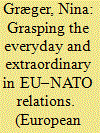|
|
|
Sort Order |
|
|
|
Items / Page
|
|
|
|
|
|
|
| Srl | Item |
| 1 |
ID:
141732


|
|
|
|
|
| Summary/Abstract |
This article investigates the Franco-British rapprochement in security and defence cooperation under Nicolas Sarkozy, Gordon Brown and David Cameron from 2008 to 2012. While in the past British Atlanticism and the French Europeanist tradition had stood in the way of close bilateral cooperation, the conclusion of several treaties of defence cooperation in this period delivered closer ties. By adopting an interpretivist perspective on events, this article argues that the rapprochement can be explained with reference principally to changes in the French tradition, which took it closer to the British Atlanticist tradition. Drawing on parliamentary and executive statements, the article traces the influence of, and changes in, the balance between Europeanism and Atlanticism in the defence policy traditions in the two countries. The article argues that the dilemmas that compelled a revision of the traditions particularly in France arose from a series of new beliefs at elite level about sovereignty over defence policy, national role conceptions and the recognition of dire budgetary constraints. In this context, Franco-British rapprochement served both countries’ national interests.
|
|
|
|
|
|
|
|
|
|
|
|
|
|
|
|
| 2 |
ID:
154463


|
|
|
|
|
| Summary/Abstract |
Much scholarly work seeking to explain the EU–NATO relationship emphasises conflicting national or institutional interests, strategic individuals, and operational inefficiencies and overlaps. This article offers an alternative account of how both the everyday and the extraordinary in EU–NATO security cooperation can be identified and analysed by applying practice theory. Despite the “Cyprus issue”, which has left EU–NATO cooperation under Berlin Plus in political stalemate, regular interaction involving civilian and military EU and NATO staff at all levels and various sites has increased over the past decade. The article shows how a practice take is well suited to uncover the practical logic at work in these, predominantly informal EU–NATO encounters; how practices are established, enacted, and also abrupted. Furthermore, it discusses how shared “background conditions” – skills and experience – facilitate practices, learning, and community-building but also competition and rivalry.
|
|
|
|
|
|
|
|
|
|
|
|
|
|
|
|
| 3 |
ID:
154467


|
|
|
|
|
| Summary/Abstract |
To cope with increasing air traffic congestion, the European Union launched the Single European Sky in the early 2000s, intending to reform the European airspace which, at that time, was still fragmented by national frontiers. However, this has not been a purely civilian task, as military air transport is likewise affected. In fact, NATO has been concerned by the challenges facing the European Air Traffic Management environment due to the growing commercial aviation since its early days. For this, the European Defence Agency has been tasked to coordinate military views, thus opening a window of opportunity for EU–NATO relations. Both organisations promoting close coordination between the users of civilian and military airspace have built direct contact with each other. While examining how NATO and the EU are shaping their informal cooperation in this sector, the article considers the airspace community of users as a configuration of relations where inevitable inter- and intra-institutional power play is involved to reform the European airspace.
|
|
|
|
|
|
|
|
|
|
|
|
|
|
|
|
|
|
|
|
|